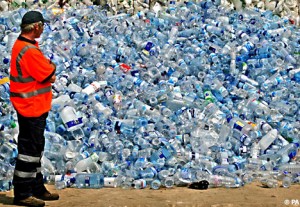Lower vs. Landfills
 I have officially cut out using plastic water bottles, woo hoo! Except I wasn’t exactly shouting that at the top of my lungs when I actually had to change my behavior and make a conscious effort not to use them this past week.
I have officially cut out using plastic water bottles, woo hoo! Except I wasn’t exactly shouting that at the top of my lungs when I actually had to change my behavior and make a conscious effort not to use them this past week.
My first encounter with experiencing the switch was last Wednesday when I bought breakfast at Lower Farinon. With out being able to purchase a water bottle I was left with either soda from the fountain or a plastic bottle orange juice. Well 9 AM was much too early for a diet coke to sound appetizing and I felt I was cheating the system by getting a bottled orange juice. So without a water button at the soda fountain I was stuck with no drink to accompany my egg white omelette. It may sound small but this was a really big moment of temptation for me, all I wanted was a nice cool drink and I couldn’t have that because of the drink options at Lower. Now that I look back on the situation I could have gone with a hot tea or coffee but even those have plastic tops. Even early on in the sustainable behavior challenge I’m realizing how dependent food consumers are on plastic products no matter how small the role of plastic may be.
It was also an adjustment to find water fountains in the academic buildings where I have class. At times it was a bit of a struggle because when getting to class I had to factor in time to for filling up my Nalgene. I could no longer get to class a minute before it began because otherwise I would have to suffer from thirst during the class period or risk getting to class late. It will be an adjustment getting to class early to fill up my reusable bottles but I’m sure that as time passes it will just become another part of my daily schedule.
The positive of this week came to me as I reflected on the big picture of my behavior change. I looked past the annoyance of refilling my water bottles and not being able to accompany my “Lower” meals with a drink and remembered why I am cutting out plastic bottles in the first place. I realized that drinking bottled water just adds more to landfills around the world but, to motivate myself I needed a few more substantial reminders. In the United States 17.6 million barrels of oil are used annually to produce plastic water bottles (“Bottled Water”). At the end of the water bottles’ life span most end up being incinerated if they are not left to “decompose” for thousands of years in landfills (“Bottled Water”). This incineration releases chlorine gas and ash containing heavy metals as well as other toxic by products (“Bottled Water”). I may be reducing a minuscule amount of oil from this production process but I feel better knowing that by the end of this challenge I will be saving cases on cases of water bottles from piling up in land fills and from releasing toxins into the atmosphere after they are incinerated.
Bottled Water . (n.d.). Retrieved from http://sustainability.duke.edu/campus_initiatives/water/bottledwater.html
Leave a Reply